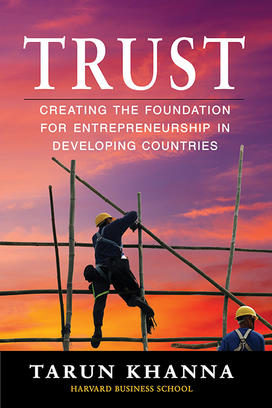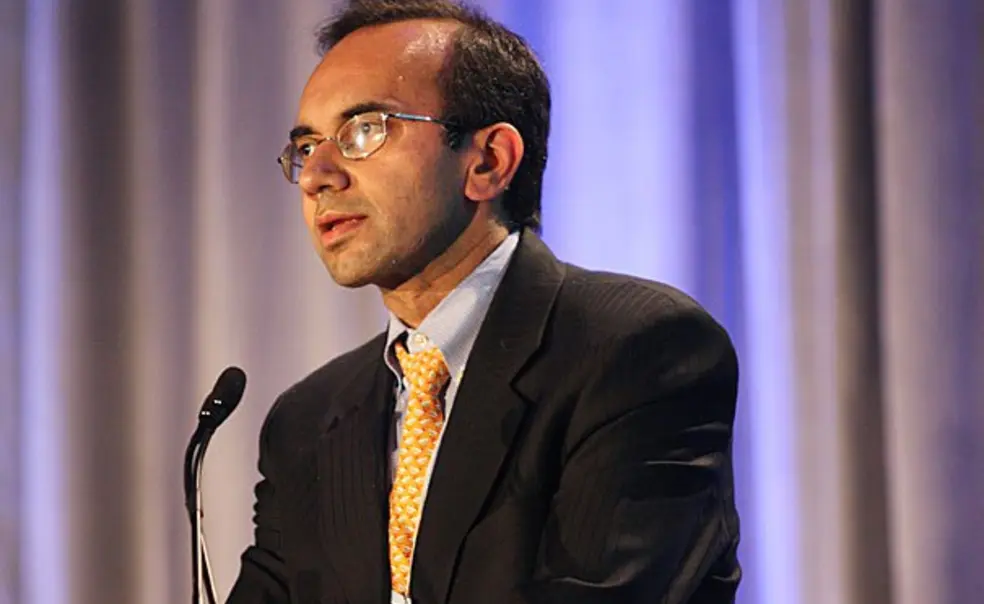Tarun Khanna ’88 on Trust and Developing-World Businesses

Harvard Business School professor Tarun Khanna ’88, an academic, angel investor, and entrepreneur, believes that businesses in the developing world must then find novel ways to build trust in order to be successful. In Trust: Creating the Foundation for Entrepreneurship in Developing Countries (Harvard Business School Press), Khanna examines the stories of several businesses and organizations in countries such as China, India, and Bangladesh, demonstrating how their successes were built upon a keen awareness of cultural dynamics that led them to cultivate trust in ways that many Western businesses would ignore. Ultimately, Khanna says it is up to businesses in the developing world to “create the conditions to create” and build support for their work.
The author: Tarun Khanna ’88 is the Jorge Paulo Lemann Professor at Harvard Business School, where he has worked for the past 25 years. Trust is his second book of stories about creative ventures, after Billions of Entrepreneurs (2008).
Opening lines: This may seem prosaic and pedestrian, but think for a minute about how we get things done in many parts of the United States. When you have an urge to buy something, the web seamlessly and instantly provides the information you need; when your faucet leaks, several plumbers, all rated by reliability, are at hand to fix it. If the plumber you hire doesn’t do a good job, there are ways to take him to task. A decade ago, my then five-year-old son locked himself in a basement room. We called the Newton city police. They were at our doorstep to unlock the door in less than ten minutes. Now, Newton—an affluent, well-run suburb of Boston—might be different from other parts of the United States. Still, in our part of the world, the conditions generally exist to summon whatever we need to just get on with life.
It’s more than that, too. If a courier service leaves large packages on my doorstep, I trust that someone won’t grab them and run. I often leave my garage door open at home, or my office door at work. I’m not trying to tempt fate, simply responding naturally to the empirical reality that, other than having suffered a minor burglary in New York City once, three decades of safety have bred in me this trust in urban life in East Coast USA. Arrangements that permeate daily life engender that kind of trust in much of the developed world.
Indeed, if you think about it, without this ambient trust, the workings of just about everything would be compromised. If I hesitated to call the local police when my son accidentally locked himself in the basement—perhaps because I thought they wouldn’t respond or I feared I’d be shaken down for a side-payment (baksheesh)—no amount of their discipline and training would be of much use.
As an angel investor, I often hand off money to a would-be entrepreneur. I trust her to use it for the purposes intended. It’s true that if some ethical lapse or fraud occurs, I can resort to accountants and lawyers and regulators to seek redress. But these are likelier to be institutions of last resort after informal means have failed—say, efforts to preserve her reputation, or the threat of blackballing her from future endeavors. Further, the use of the formal entities would require me to trust them in the first instance.
Reviews: “Khanna’s book is right on target in spotlighting the supreme importance of trust not just in private entrepreneurship but in all connections between entrepreneurs and government, civil society, and people. As Khanna’s examples compellingly demonstrate, building and maintaining healthy levels of trust is crucial for human progress.”—Muhammad Ali Pate, former Minister of State for Health, Nigeria












No responses yet